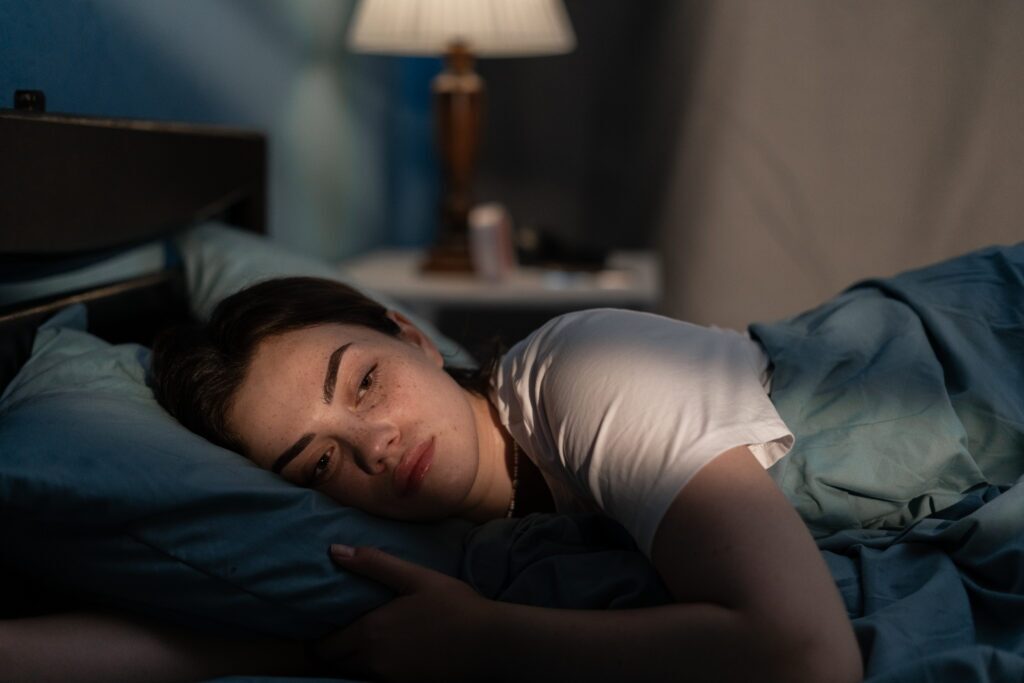Medical Review by Jennie Stanford, MD, FAAFP, DipABOM
Summary:
- Research suggests that your genes might play a larger role in how much sleep you get than previously thought.
- Studies also show how disruptions in your sleep cycle can contribute to insomnia and make symptoms worse.
- Using wearable devices and apps may help provide more data for sleep research and support the development of personalized treatment plans, as long as the quality of the data remains strong.
- Both medication and cognitive-behavioral therapy for insomnia (CBT-I) can be effective treatment options.
Staying informed helps you talk to your healthcare provider about treatment
Insomnia is a common sleep disorder, so there has been a lot of research about it. Staying updated on the most current developments can guide your conversations with healthcare providers and make it easier to work with them on an effective treatment plan.
Below, you can read about some of the most recent studies and developments in insomnia research. You’ll also learn about how these findings could influence treatment approaches to insomnia—now and in the future.
How sleep & your body influence each other
Recent studies have shown that specific individuals have a genetic predisposition to insomnia, which helps explain why some people are more prone to this sleep disorder.
- A study published in Nature Genetics in 2019 suggests that genetics can have an influence on how much sleep you get, as well as how efficiently you sleep. This could help clarify why people experience insomnia differently and may help personalize some treatments for insomnia in the future.
- A lack of sleep may also have physical symptoms that weren’t previously well-known. Advances in neurobiological research from 2018 have provided further evidence for the claim that you have more trouble sleeping when your body or brain is too active. This suggests that future treatments for insomnia might focus more on managing your exposure to stress.
Insomnia & your sleeping patterns
Research has shown that insomnia is associated with disruptions in sleep patterns—and that this may have broader implications for your mental health:
- A 2021 study in Frontiers in Psychiatry found that the REM sleep disturbances caused by insomnia might also be a risk factor for developing depression.
- Research from 2023 suggests that consistent sleep patterns might actually be more important for your health than the total amount of sleep you get. This could lead to treatment strategies with a heightened focus on sleep hygiene—including waking up and going to bed at similar times each day.
Technological innovations in sleep research
Technology has transformed sleep research by providing innovative tools to monitor and study sleep patterns. Wearable products like the Fitbit and Apple Watch have become popular tools for collecting sleep data, offering researchers a great deal of information on sleep habits and disturbances.
Research from 2019 highlights the potential for these devices to offer healthcare professionals much more useful data on people’s health and sleep habits than what was previously available. However, this research notes that further study is needed to make sure these devices do not provide skewed data to medical and scientific professionals.
New methods of treating insomnia
The field of insomnia treatment continues to advance, with the development of new medications aimed at improving effectiveness and minimizing side effects.
- A study published in the Journal of Sleep Research in 2023 discusses a relatively new type of medication called an orexin receptor antagonist, which has shown promise in treating chronic insomnia without the risk of dependency commonly associated with traditional sedatives. FDA-approved orexin receptor antagonists include suvorexant, lemborexant, and daridorexant.
- In addition to drugs, cognitive-behavioral therapy for insomnia (CBT-I) remains a highly effective non-drug treatment option. In fact, a 2019 study from The American Journal of Lifestyle Medicine states that this type of therapy currently isn’t used as much as it should be, and it also claims that it has effectiveness that’s equivalent to sleep medication.
The relationship between insomnia & mental health
The relationship between insomnia and mental health has been a critical area of research, especially since the COVID-19 pandemic. Several studies show that rates of insomnia doubled since the pandemic, while anxiety and depression rates rose as well. Sleeping problems were also linked to poorer mental health outcomes.
Emerging therapies & treatment approaches
New and innovative methods for managing insomnia are consistently being investigated. One promising study area involves using techniques like repetitive transcranial magnetic stimulation (rTMS), where magnetic fields are used to gently stimulate certain areas of the brain.
A study published in Brain Research Bulletin in 2024 showed that repetitive TMS has potential to reduce insomnia symptoms in patients that have not seen success with other methods.
Several stress management techniques based on mindfulness have also gained attention over whether they might help with insomnia. A clinical trial provided evidence that mindfulness-based therapy for insomnia could significantly reduce insomnia and depression symptoms while calming the brain.
Impact of insomnia on physical health
Recent research supports the link between the amount of sleep you get and your physical health. For example, a narrative review of research from 2023 highlights the relationship between insomnia and heart problems, showing that the risk for cardiovascular disease goes up significantly in people who have insomnia and sleep less than six hours per night.
Additionally, insomnia is linked to metabolic disorders like diabetes. A 2024 study in Diabetes Care suggests that your risk of developing type 2 diabetes goes up when the quality of your sleep is poor.
Future directions & promising areas of study
Research about insomnia is ongoing. The National Center on Sleep Disorders Research has released a sleep research plan with five main goals, which include the following:
- Looking more closely at how your circadian rhythms work to improve sleep quality
- Reducing the risks and improving the treatments for sleep disorders
- Improving the way research is implemented in clinical settings
- Focusing on differences in sleep health for different cultural and socioeconomic groups
- Developing a stronger and more diverse workforce for ongoing research
As these areas continue to be explored, they have the potential to revolutionize our understanding and treatment of insomnia. Staying informed about these advancements can help you and your healthcare provider make informed decisions about how to manage your insomnia effectively.
How Lemonaid Health can support you with current information
If you are looking for personalized support managing insomnia, Lemonaid Health can help. We provide virtual consultations with qualified healthcare professionals based in the US, who can help you with up-to-date information and prescribe sleep medication if clinically indicated. Together, we can support your journey towards better sleep health.












